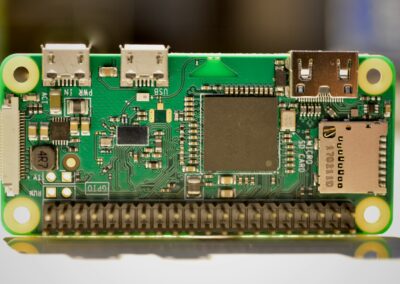Balancing Privacy and Data Utility in IoT Networks
The Role of Pseudonymization in IoT Data Management
Pseudonymization in IoT data management is a powerful tool for enhancing privacy while maintaining the utility of the data. As IoT networks expand rapidly in regions like Saudi Arabia and the UAE, particularly in cities such as Riyadh and Dubai, the need to protect personal and sensitive information has become more pressing. IoT devices generate vast amounts of data, much of which is personal or sensitive in nature, raising significant privacy concerns. Pseudonymization, which replaces identifiable information within data sets with pseudonyms, offers a way to protect privacy without compromising the usefulness of the data.
For example, in Riyadh’s smart healthcare initiatives, IoT devices monitor patient health and collect data that can be used to improve treatment outcomes. Pseudonymization ensures that this data can be analyzed and shared for research or public health purposes without revealing the identities of individual patients. By replacing patient names, addresses, and other identifiers with pseudonyms, healthcare providers can protect patient privacy while still benefiting from the insights gained through data analysis.
Similarly, in Dubai’s smart city projects, IoT devices collect data on traffic patterns, energy usage, and public safety. Pseudonymization allows city planners to use this data to optimize infrastructure and services without compromising the privacy of residents. By ensuring that individual identities are not linked to the data, city planners can maintain public trust while leveraging IoT data to enhance urban living. The use of pseudonymization in these contexts demonstrates its effectiveness in balancing privacy with data utility.
Effective Techniques for Pseudonymization in IoT
Implementing pseudonymization in IoT data management requires the use of effective techniques that ensure privacy without degrading the utility of the data. Businesses and organizations in Saudi Arabia and the UAE must adopt best practices for pseudonymization to protect sensitive information while maintaining the functionality of their IoT networks.
One of the most effective techniques is tokenization, where identifiable data elements are replaced with a token, or pseudonym, that has no intrinsic meaning or value outside of its intended context. In Riyadh’s financial sector, for instance, IoT devices might collect transaction data that includes customer information. By tokenizing this data, businesses can ensure that even if the data is intercepted or accessed without authorization, the identities of the customers remain protected. The tokenized data can still be used for analysis and reporting without compromising privacy.
Another effective technique is data masking, where identifiable information is obscured or altered in a way that prevents unauthorized individuals from recognizing the data while still allowing it to be used for its intended purpose. In Dubai’s retail sector, where IoT devices are used to track customer behavior and preferences, data masking can be applied to anonymize customer information. This ensures that customer privacy is protected while allowing businesses to analyze shopping patterns and optimize their offerings. Data masking is particularly useful when data needs to be shared with third parties for analysis or processing.
Additionally, differential privacy is an emerging technique that can be applied to IoT data to provide strong privacy guarantees. Differential privacy adds statistical noise to data sets in a way that prevents the identification of individuals while preserving the overall accuracy of the data. This technique is particularly valuable in large-scale IoT deployments, such as those in smart cities, where data from millions of devices must be aggregated and analyzed without compromising individual privacy. By adopting these techniques, businesses and organizations can implement effective pseudonymization strategies that enhance privacy while maintaining the utility of IoT data.
Implementing Pseudonymization Strategies for IoT Success
Integrating Pseudonymization into IoT Data Management
To fully benefit from pseudonymization, businesses and organizations in Saudi Arabia and the UAE must integrate these techniques into their overall IoT data management strategies. This involves designing IoT systems with privacy in mind from the outset, ensuring that pseudonymization is applied consistently across all data collection, storage, and processing activities.
In Riyadh’s industrial automation sector, for example, IoT devices monitor and control production processes, generating vast amounts of operational data. By integrating pseudonymization into their data management strategies, businesses can protect sensitive operational data from unauthorized access while still allowing it to be used for process optimization and decision-making. This requires collaboration between data engineers, security experts, and operational managers to ensure that pseudonymization techniques are effectively implemented without disrupting operations.
Similarly, in Dubai’s tourism and hospitality sector, where IoT devices are used to enhance guest experiences and manage hotel operations, pseudonymization can be used to protect guest data. By applying pseudonymization to data such as booking details, room preferences, and service requests, hotels can maintain guest privacy while still using the data to personalize services and improve operational efficiency. Integrating pseudonymization into IoT data management strategies in this way ensures that privacy is protected without sacrificing the benefits of IoT technologies.
Furthermore, businesses should establish clear policies and procedures for managing pseudonymized data, including how it is stored, accessed, and shared. In Riyadh’s financial institutions, for example, policies should specify how tokenized transaction data is stored and who has access to the de-tokenization keys. By establishing and enforcing these policies, businesses can ensure that pseudonymized data remains secure and that privacy is consistently maintained throughout the data lifecycle.
Ensuring Compliance with Privacy Regulations
Compliance with privacy regulations is another critical aspect of implementing pseudonymization in IoT data management. Businesses and organizations in Saudi Arabia and the UAE must ensure that their pseudonymization practices align with local and international privacy laws to avoid legal and financial penalties while protecting customer trust.
In Riyadh’s healthcare sector, for instance, compliance with regulations such as the Saudi Health Information Exchange (SHIE) guidelines is essential for protecting patient data. These regulations require healthcare providers to implement robust privacy measures, including pseudonymization, to safeguard patient information. By adhering to these guidelines, healthcare providers can ensure that they meet regulatory requirements while also protecting patient privacy.
Similarly, in Dubai’s financial sector, compliance with regulations such as the UAE Data Protection Law is crucial for protecting customer data. These regulations mandate the use of pseudonymization and other privacy-enhancing techniques to protect sensitive financial information. By ensuring compliance with these regulations, financial institutions can avoid legal risks and maintain the trust of their customers and partners.
To achieve compliance, businesses should regularly audit their pseudonymization practices and update them as necessary to align with evolving regulations. In Dubai’s retail sector, for example, regular audits can ensure that data masking techniques are applied correctly and that customer data remains protected in accordance with legal requirements. By prioritizing compliance, businesses can demonstrate their commitment to privacy and build long-term trust with their stakeholders.
Continuous Improvement and Innovation
As the IoT landscape continues to evolve, so too must the strategies for managing data privacy. Continuous improvement and innovation in pseudonymization techniques are essential for keeping pace with new challenges and opportunities. Businesses and organizations in Saudi Arabia and the UAE must stay informed about the latest advancements in pseudonymization and privacy-enhancing technologies to ensure that their IoT data management practices remain effective and up-to-date.
In Riyadh’s technology sector, businesses can invest in research and development to explore new pseudonymization techniques that offer even stronger privacy protections. For example, advancements in quantum computing may enable more sophisticated forms of pseudonymization that provide greater security without compromising data utility. By staying at the forefront of these developments, businesses can maintain a competitive edge in the rapidly evolving IoT landscape.
Similarly, in Dubai’s smart city initiatives, continuous innovation in pseudonymization can help address the growing complexity of IoT networks. As the number of IoT devices increases, so too does the volume of data that must be managed and protected. By adopting cutting-edge pseudonymization techniques and continuously refining their data management strategies, city planners can ensure that smart city data remains secure and that residents’ privacy is respected.
Conclusion
In conclusion, pseudonymization in IoT data management is a powerful tool for enhancing privacy while maintaining the utility of data. For businesses and organizations in Saudi Arabia and the UAE, adopting effective pseudonymization techniques such as tokenization, data masking, and differential privacy is essential for protecting sensitive information. By integrating these techniques into their IoT data management strategies, ensuring compliance with privacy regulations, and continuously innovating, businesses can achieve a balance between privacy and data utility, ensuring long-term success in the digital age.
—
#IoTSecurity, #Pseudonymization, #DataPrivacy, #IoTDataManagement, #SmartTechnology, #BusinessEfficiency, #SaudiArabia, #UAE, #Riyadh, #Dubai, #AI, #Blockchain, #Metaverse, #ExecutiveCoaching, #GenerativeAI, #Leadership, #Management, #ProjectManagement































